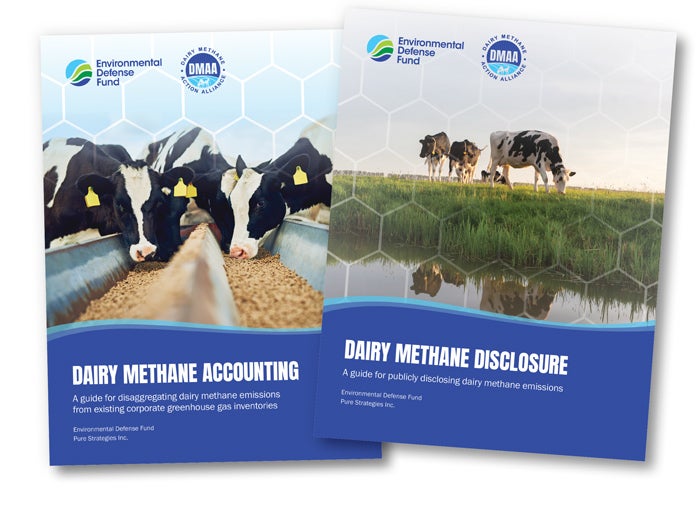Advancing emissions transparency: New guidance supports dairy sector progress on driving down methane

As COP29 gets underway this week, we are reflecting on the progress made since COP28, where six pioneering companies – Bel, Danone, General Mills, Kraft Heinz, Lactalis USA and Nestlé — joined forces with Environmental Defense Fund to launch the Dairy Methane Action Alliance, joined in the spring by Clover Sonoma and Starbucks.
As the first milestone, these companies have committed to account for and disclose dairy methane emissions separately in climate disclosures. To support Alliance members and the broader industry as a whole, EDF, with support from Pure Strategies, is pleased to offer the global dairy and food sector a foundational framework for companies to begin their dairy methane journey: “Dairy Methane Accounting: A Guide for Disaggregating Dairy Methane Emissions from Existing Corporate Greenhouse Gas Inventories,” with a foreword from the International Dairy Federation, and “Dairy Methane Disclosure: A Guide for Publicly Disclosing Dairy Methane Emissions.”
These resources will help dairy companies and companies that source dairy ingredients accurately account for and disclose value chain methane emissions—the first steps toward action and transparency on methane from dairy.
EDF has shared these resources with companies in the Dairy Methane Action Alliance, and EDF and our nonprofit partner Ceres are currently reviewing the dairy methane data that the member companies have shared with us. By joining the Alliance, companies have committed to public disclosure of this data within the next year. Congratulations to the Alliance members Bel Group and Lactalis USA for leading the way by publishing their methane emissions data today.
Why Target Dairy Methane?
A potent greenhouse gas, methane has 80 times the warming power of carbon dioxide in the first twenty years after it enters the atmosphere. Agriculture is responsible for nearly 40% of human-caused methane emissions, the majority of which comes from livestock. This means that companies that source dairy have a powerful opportunity to play a leading role in driving down near-term warming by targeting methane emissions in their supply chains.
If we can collectively take action on methane today, we’ll see the difference in our lifetimes.
Disaggregating Dairy Methane Emissions: A New Framework for Action
Historically, technical guidance and accounting frameworks have not provided the necessary direction to disaggregate dairy-related emissions by greenhouse gas and process (e.g., enteric fermentation, manure management, feed). EDF, with support from Pure Strategies, has addressed this gap by publishing technical guidance for disaggregating methane emissions using commonly referenced data sources.
The “Dairy Methane Accounting” guide offers the dairy sector a step-by-step approach to developing a methane inventory, starting with setting up a corporate greenhouse gas (GHG) inventory for methane disaggregation and detailing the methodology for disaggregating methane emissions.
The Role of Public Disclosure
The “Dairy Methane Disclosure” guide helps dairy companies track their methane emissions using their existing GHG inventories. Public disclosure of these emissions is essential because methane-specific disclosure helps target reduction efforts and track progress toward goals, ensuring accountability in a landscape of growing investor focus on sustainability, new disclosure regulations, and consumer demands for transparency.
As dairy companies strive to reduce methane emissions to differentiate themselves in the marketplace and enhance the resiliency of their supply chains in the face of climate change, streamlined guidance for reporting on agricultural dairy methane is critically needed.
What is the Dairy Methane Action Alliance?
Recognizing the urgency of the climate crisis and the critical role of the food sector in reducing global methane emissions, the Dairy Methane Action Alliance was launched at COP28 in December 2023 to drive accountability, transparency, and ambitious climate action within the dairy industry. Learn more here.
Next Steps
EDF, Ceres, and Pure Strategies have collaborated on a robust dairy methane action plan template, and have shared that template with Alliance members, who are now working on creating their dairy methane action plans. We plan to publish this template in 2025, making it accessible for all companies who source dairy ingredients.
Together, action from members of the Dairy Methane Action Alliance is poised to drive transformation across value chains, with the companies involved representing $230 billion in annual global sales.
Leadership by these significant companies sets a precedent for ambitious climate action to avoid the worst impacts of climate change – and supports a broader transformation in the food system.
Would your company like to learn more about the Dairy Methane Action Alliance and join sustainability leaders in building a more sustainable dairy sector? Get in touch with our team here.
Related Content
Dairy Methane Stakeholder Engagement: A guide for engaging stakeholders on dairy methane emissions mitigation
Dairy Methane Action Plan: A guide to planning and disclosing actions to reduce dairy methane emissions
Dairy Methane Accounting: A guide for disaggregating dairy methane emissions from existing corporate greenhouse gas inventories